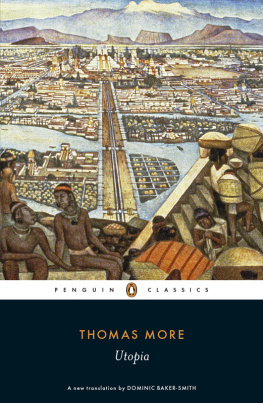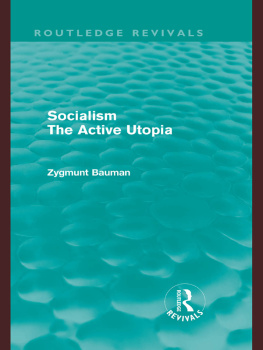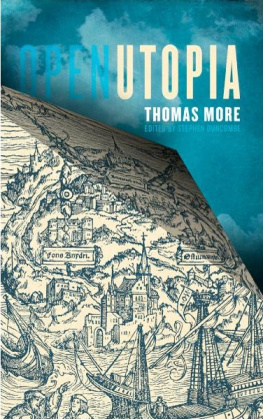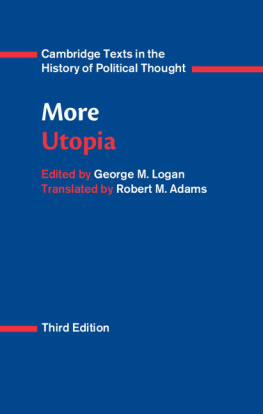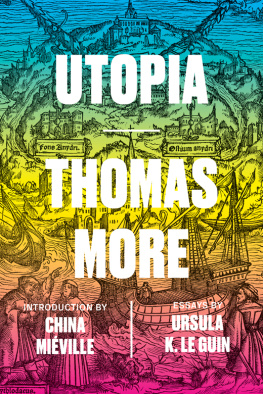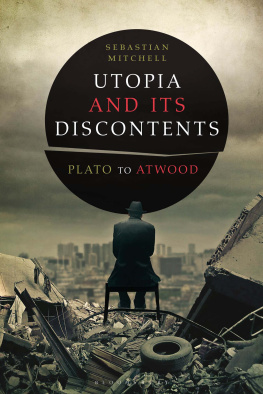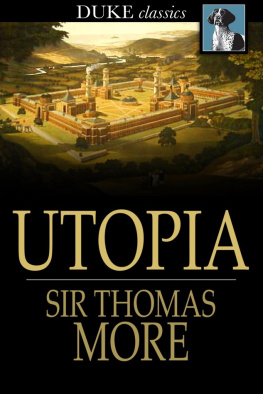THOMAS MORE was born a Londoner in 1478, the son of a successful lawyer. He served as a page in the household of Cardinal Morton, who sent him on to study at Oxford. Summoned by his father to legal studies in London, he was called to the Bar from Lincolns Inn in 1501. He had a precocious career in the City, acting for the Mercers Company, sitting in Parliament, and becoming Undersheriff. Sent on an embassy to Flanders in 1515, he began Utopia there and completed it back in London. He became a privy councillor of Henry VIII in 1518 and was elected Speaker of the Commons in 1523; six years later he succeeded Cardinal Wolsey as Lord Chancellor, becoming the tenth layman to hold that office. From 1528 he actively resisted innovation in religious matters, writing works against Luther and Tyndale, among others, and sought to restrict the spread of heresy. Henry VIIIs estrangement from Rome on account of his desire to divorce Catherine of Aragon increasingly put Mores position under pressure and he resigned as Chancellor in 1532, although he remained involved in controversy. Required in 1534 to take the oath of succession, which rejected Papal jurisdiction and the validity of Henrys marriage to Catherine, he declined and was sent to the Tower of London. During his imprisonment he wrote a number of spiritual works, among them A Dialogue of Comfort against Tribulation, one of his finest writings. In July 1535, after he refused to accept the royal supremacy over the Church, he was tried as a traitor at Westminster Hall and beheaded on Tower Hill. His death caused shock abroad, especially among his fellow humanists. Adopted by the Catholic Counter-Reformation as an exemplary figure, he was canonized by Pope Pius XI in 1935.
DOMINIC BAKER-SMITH graduated from Trinity College, Cambridge. After teaching in Canada he returned to Cambridge where he was a Fellow of Fitzwilliam College and Lecturer in the Faculty of English. In 1976 he became Professor of English at University College, Cardiff, and then moved to the University of Amsterdam in 1981 where he is now Emeritus Professor. In addition to various publications on English and Neo-Latin literature he is the author of Mores Utopia (1991, 2000) and has edited three volumes in the Toronto Collected Works of Erasmus. He has served as Chairman of the Society for Renaissance Studies and was appointed OBE in 1999.
PENGUIN CLASSICS
Published by the Penguin Group
Penguin Books Ltd, 80 Strand, London WC 2 R 0 RL , England
Penguin Group (USA) Inc., 375 Hudson Street, New York, New York 10014, USA
Penguin Group (Canada), 90 Eglinton Avenue East, Suite 700, Toronto, Ontario, Canada M 4 P 2 Y 3 (a division of Pearson Penguin Canada Inc.)
Penguin Ireland, 25 St Stephens Green, Dublin 2, Ireland (a division of Penguin Books Ltd)
Penguin Group (Australia), 250 Camberwell Road, Camberwell, Victoria 3124, Australia (a division of Pearson Australia Group Pty Ltd)
Penguin Books India Pvt Ltd, 11 Community Centre, Panchsheel Park, New Delhi 110 017, India
Penguin Group (NZ), 67 Apollo Drive, Rosedale, Auckland 0632, New Zealand (a division of Pearson New Zealand Ltd)
Penguin Books (South Africa) (Pty) Ltd, Block D, Rosebank Office Park, 181 Jan Smuts Avenue, Parktown North, Gauteng 2193, South Africa
Penguin Books Ltd, Registered Offices: 80 Strand, London wc2r 0rl, England
www.penguin.com
This translation first published in Penguin Classics 2012
Copyright Dominic Baker-Smith, 2012
Cover: detail of La Gran Tenochtitln from the Pre-Hispanic and Colonial Mexico cycle by Diego Rivera, in the Palacio Nacional, Mexico City, 194552. 2012 Banco de Mxico Diego Rivera Frida Kahlo Museums Trust, Mexico, D.F./DACS (Photograph: Sean Sprague/Mexicolore/The Bridgeman Art Library)
All rights reserved
The moral right of the translator and editor has been asserted
ISBN: 978-0-14-139220-2
Chronology
1478 7 February: Thomas born in Milk Street, Cripplegate, London, eldest son of John More, then a barrister, and his wife Agnes.
c. 148290 Attends St Anthonys School, Threadneedle Street.
1485 22 August: Battle of Bosworth: King Richard III killed; Henry Tudor succeeds as Henry VII.
c. 149092 Serves as a page in the household of Cardinal Morton, Archbishop of Canterbury and Lord Chancellor.
c. 14924 At Oxford, possibly at St Marys Hall. In October 1492 Columbus lands on San Salvador.
c. 1494 Commences law studies at New Inn; admitted to Lincolns Inn in 1496.
c. 1497 Latin verses printed in John Holts Lac puerorum. In June John Cabot reaches Newfoundland.
1499 Meets Erasmus on his first visit to England; takes him to visit the royal children at Eltham Palace. Around this time More lodges in or near the London Charterhouse.
1501 Qualifies as a barrister; pursues Greek studies with William Grocyn and Thomas Linacre; gives lectures on St Augustines City of God at the church of St Lawrence Jewry.
1503 Writes A rueful lamentation on the death of Henry VIIs Queen Elizabeth.
1504 Marries Joanna Colt and resides at the Old Barge, Buck-lersbury; possible date for his first entry to Parliament. Amerigo Vespuccis fourth voyage (in April he leaves 24 Portuguese sailors at Cape Frio in Brazil, the supposed occasion of Raphael Hythlodays journey to Utopia).
15056 Erasmus stays at the Old Barge and collaborates with More in translating writings by the Greek author Lucian into Latin.
1509 Death of Henry VII and accession of Henry VIII; Mores commemorative verses on the coronation are presented to the king. In October Erasmus arrives from Italy and completes The Praise of Folly (dedicated to More) in Mores house.
1510 Becomes a member for London in the new Parliament and is appointed Undersheriff of the City; about this time his The Life of John Picus (Giovanni Pico della Mirandola, 146394) is published.
1511 Death of his wife Joanna; marries Alice, widow of John Middleton, merchant of the Calais Staple.
1513 Henry VIII invades France and captures Throuanne and Tournai. Around this time More begins work on Richard III, in Latin and English, and continues to c. 1519, leaving it unfinished. In Florence Machiavelli writes The Prince (published in 1532).
1515 MayOctober, travels to Bruges as a member of a delegation to review trading terms; during a break in negotiations he meets Peter Giles in Antwerp and begins work on Utopia. At Bruges in October he writes the Letter to Martin Dorp in defence of Erasmus and of literary studies.
1516 Completes Utopia in London and sends manuscript to Erasmus in September; the first edition appears in December, printed by Thierry Martens in Louvain.

